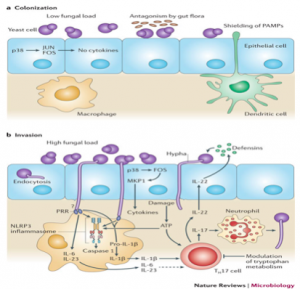Chronic Candidiasis and the Link to Leaky Gut
Candida organisms can create a myriad of metabolic toxins, including various enzymes, that can adversely affect cellular biochemistry, mitochondria function and cell membrane integrity. Leaky gut is another consequence of chronic candida. The image below (from Nature Reviews, Microbiology) shows invasive candida and its link to transcellular (between cells) and paracellular (through cells) function and ultimately to the problem of leaky gut. How this occurs is through two specialized candida proteins, Adhesin and Invasin.

This image shows two different scenarios linked to normal colonization of candida (a) and invasive candida with its hypha structure piercing directly through an epithelial cell (paracellular) and through the tight junction between two separate epithelial cells (transcellular). Therefore, candida is compromising epithelial function in multiple ways (b).
Candida, along with other microorganisms, can produce various proteins that allow it to adhere to different cells. A protein called ‘Adhesin’ is one mechanism candida uses to colonize itself in different tissue structures. Another protein called ‘Invasin’ allows for candida to invade cells by inducing endocystosis or causing the invasive limb structure of candida to grow through the
tight junction space leading to leaky gut. At other times the hypha of candida can grow directly through an epithelial cell engaging macrophage activity on the other side of the mucosal barrier. These mechanisms can lead to leaky gut and subsequent problems related to allergy, inflammation, fatigue, etc. Also, chronic candida can interfere with nutrient absorption too by damaging the absorptive surfaces of the intestinal cells as well.
Although it can be difficult to test specifically for Adhesin and Invasin production from candida, there are tests that evaluate for aggressive Candida. One such profile is the Organic Acids Test (OAT) from Great Plains Laboratory which measures various toxins and byproducts of candida’s existence in the digestive system. Cyrex Labs has a blood profile that measures antibodies to tight junction proteins which can give insight into damage of this important structure necessary for maintenance of the intestinal lining.

